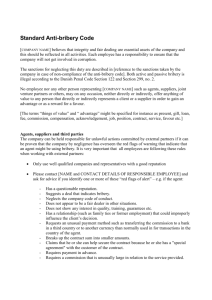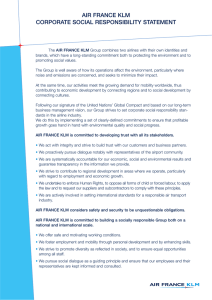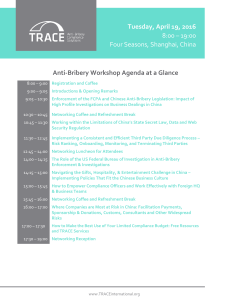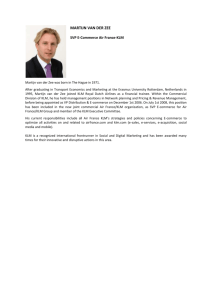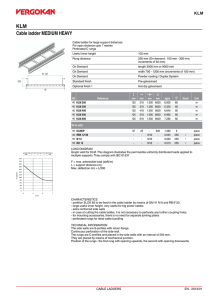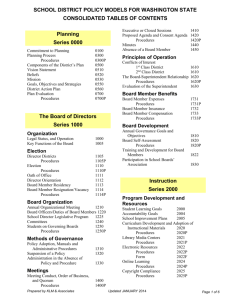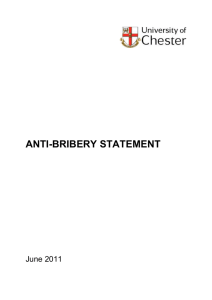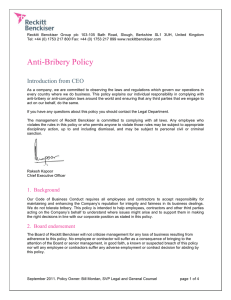AIR FRANCE and KLM Anti-Bribery Manual
advertisement
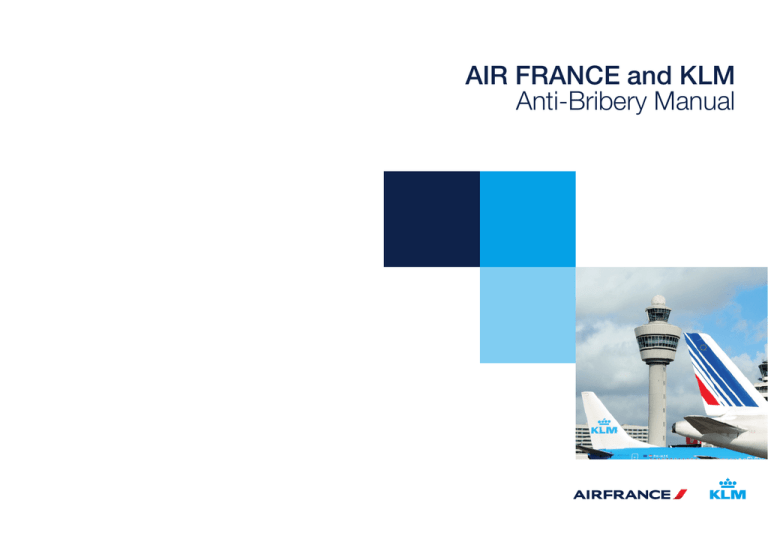
AIR FRANCE and KLM Anti-Bribery Manual AIR FRANCE and KLM Anti-Bribery Manual Preface 5 Introduction7 1 What is a bribe 9 2 Public or governmental officials 10 3 Gifts and hospitality 12 4 Facilitation payments 14 5 Procurement and bidding procedure 16 6 Third parties 17 7 Local custom 21 What if I have further questions 21 03 Preface The Air France-KLM group emphasizes it is its policy to do business with loyalty, fairness, transparency, honesty and integrity and to fully comply with all anti-bribery laws in any location in which its two companies and subsidiaries conduct their business. This Manual establishes guidelines for handling bribery concerns. Conduct in violation of the anti-bribery laws can be a criminal offence and could severely jeopardize Air France-KLM’s financial position, reputation and continued viability. Air France and KLM require that these guidelines are to be observed by not only all employees of Air France and KLM, but also by our agents, consultants, distributors suppliers or others acting on behalf of Air France and/or KLM or with whom we do business, including operations conducted by any subsidiaries or (joint venture) partners. These principles should be applicable to all employees of the Air FranceKLM group. Please read this Manual carefully. It is the responsibility of each and every director, officer and employee in Air France or KLM, and any third party acting on behalf of Air France or KLM, to understand these guidelines, as we expect you to be familiar with them and comply fully with them and also the relevant anti-bribery laws wherever you do business. This Manual cannot answer all of your questions and should not be considered as a substitute for specific legal advice. That is why we urge you to seek advice from the experts named in this Manual every time you are in need of any further information. With your help, we are confident that our Air France-KLM group will continue to deserve the trust that everyone has in us. A. de Juniac F. Gagey C.M.P.S. Eurlings Chairman and CEO Chairman and CEO President and CEO of Air France-KLM of Air France of KLM 05 Introduction What is the purpose of anti-bribery laws? Bribery poses very serious threats to the proper operation of free markets. It distorts competition and represents serious reputational and legal risks. Bribery occurs when anything of value is offered, directly or indirectly, to induce or reward someone for acting in violation of his/her lawful duties or to induce someone to use his/her influence in order to assist in obtaining or retaining business or to direct business to anyone or where you know or believe the recipient is not permitted to receive the thing of value. Anti-bribery legislation prohibits you (1) to bribe any another person, whether he/she is a governmental/public official or not, and (2) to receive bribes. Legal environment All countries that are members of the organisation for Economic Cooperation and Development (OECD), such as France and The Netherlands, have adopted legislation which criminalises the bribery of government officials, including foreign government officials. Similar conventions have been adopted by other international bodies, including the United Nations Convention Against Corruption, the African Union’s Convention on Preventing and Combating Corruption and the Convention on Corruption of the Council of Europe. In addition to these conventions, legislation such as the UK Bribery Act also prohibits bribery of private individuals (acts that do not involve government or public officials). What are the risks of non-compliance with anti-bribery laws? Much is at stake for companies that violate anti-bribery laws. In recent years, national authorities have increased their enforcement activities regarding bribery. Penalties for violation of anti-bribery laws can be severe. In most jurisdictions, both companies and individuals can be liable for a criminal offence. The exact extent of criminal liability will depend on the law of a particular country. In the UK, a company convicted of failing to prevent bribery can 07 receive an unlimited fine. For individuals, the penalties may run up to 10 years imprisonment. Companies and individuals may be prosecuted for corruption in 1. WHAT IS A BRIBE? their home countries, in the country where the corruption took place, and in other countries, including the USA or UK. You are prohibited and anyone else who performs services on behalf of Air France or KLM (such as subsidiaries, (joint venture) partners, affiliates, agents, In addition to direct sanctions for bribery, companies involved in enforcement consultants, distributors or other representatives of the companies) – to bribe proceedings may be prohibited from making sales to government customers or another person and to receive bribes for yourself or another. organizations. Loss of such sales opportunities in many cases can have a greater More specifically, it is prohibited: financial impact on a company than the direct sanctions of the enforcement proceeding itself. • to directly or indirectly offer, promise or give a bribe to or for the benefit of someone else with the intention to persuade him/her to act in violation of his/ Also, both individuals and companies involved in bribery are at risk of being sued her lawful duties which you know or believe they are not permitted to accept and being found liable to compensate other individuals or companies who may (either under local laws or other rules to which they are subject, for example have suffered losses as a result of the corrupt act. This may occur where, for the employer’s rules) or to induce someone to use his/her influence in order to example, an unsuccessful bid participant sues a successful bid participant who assist in obtaining or retaining business or to direct business to anyone; and has been corruptly awarded a contract in order to recover lost tender costs and lost profit. • to directly or indirectly request or agree to receive or benefit from a bribe to induce you to act in violation of your lawful duties or to induce you to use your influence in order to assist in obtaining or retaining business or to direct Further potential impacts of bribery include cost of professional fees, reputational damage, loss of customers and liabilities for officers and employees. business to anyone. A bribe can be anything of value such as cash money, goods, services, favors, discounts, gifts, tickets to entertainment, social or sports events and dinners. It basically encompasses any financial or other advantage you can think of. Q. One of your business relations, a supplier of aircraft spare parts, offers you and your spouse a dinner in a luxurious restaurant. The supplier won’t attend the dinner himself. Can you accept the offer? A. No, you can’t. A dinner in a luxurious restaurant offered by a business relation without a legitimate business purpose and without the giver himself attending, is considered inappropriate and unreasonable. You should politely decline the offer. 09 2. PUBLIC OR GOVERNMENTAL OFFICIALS Anti-bribery legislation is especially strict in relation to public or governmental officials. Gifts and hospitality that are acceptable between private business partners may be unacceptable between a business and a public official. It is expressly forbidden to directly or indirectly offer, promise or give a financial or other advantage to a public official with the intention of influencing the official in his or her performance of his or her official functions to obtain or retain business. A public or governmental official is for the purpose of these guidelines: The guidelines also prohibit an offer, payment, promise to pay or authorisation of payment of any money, gift, or anything of value to any government official for purposes of: • influencing any act or decision of the government official; • inducing the government official to act in violation of his/her lawful duties; • securing an improper advantage from the government official; or • inducing him/her to use his/her influence with a governmental agency, in order to assist in obtaining or retaining business or to direct business to anyone. The ‘obtaining or retaining business’ element is interpreted broadly to include business advantages, such as obtaining a permit or a tax break. • an officer or government employee (holding an administrative, judicial or legislative mandate) or any person acting in an official capacity for or on behalf of such government (e.g. an entity hired to review bids on behalf of a government agency or to collect custom duties); • an officer or employee of a public international organisation or any person acting in an official capacity for or on behalf of such public international organisation (including, for example, the United Nations, the World Bank, the European Commission, etc.); • an employee of a company or other business entity in which a governmental body has an ownership interest and/or over which such governmental body may, directly or indirectly, exercise a dominant influence (such employee can qualify as a government official even if he or she is engaged in commercial, rather than governmental, activities); and • a political party or a member of a political party or a candidate for political office. Additional caution should be applied in respect of persons who are known or suspected to be family members of government officials or in respect of companies who are controlled by family members of government officials. 11 3. GIFTS AND HOSPITALITY • contrary to the rules of professional this is applicable to the potential recipient; or • done with a view to obtaining any improper advantage; or Providing gifts and hospitality (meals, travel, entertainment) is often considered a form of business courtesy and is common in everyday business in many countries • not duly accounted for in the books and records of the giver and in a manner which permits reasonable traceability. and is recognized as an established part of doing business. There is a very fine line separating business courtesies and corruption. Any charitable donation, (political) contribution or sponsorship on behalf of the company should not be permitted unless prior approval by the responsible The Air France and KLM guidelines prohibit offering or providing anything in hierarchical manager has been given and unless potential conflict of interest that value, including gifts and hospitality, to a third party in order to obtain an improper could affect a material transaction has been cleared. They must not be made advantage or otherwise unjustly influence action. where they could influence a current bidding situation or be given subsequently as a ‘reward’ for the awarding of a contract. The acceptance of gifts and hospitality is regulated more specifically in many countries because it is seen as one of the most obvious forms of bribery. Particular concerns arise when such acceptance is in some way connected with a potential Q. In the context of contract negotiations with a customer you’ve arranged for a business transaction or regulatory approval. Generally, expenditures connected visit to your offices. The customer has asked you whether he/she can bring with government officials are considered to create a particular risk. his/her spouse. Are you allowed to arrange for travel and entertainment for the customer’s spouse? Giving gifts or hospitality Please note that bona fide, reasonable and proportionate gifts, hospitality A. No, you’re not allowed to. Reasonable and proportionate expenses such as and other similar business expenditure intended to develop relationships with certain travel expenses, hotel and dinner arrangements for the customer in the business people or other third parties are not prohibited as such if they are context of the visit are legitimate. However, expenses for the spouse are in this given without expectation of consideration or value in return. However, when case not specifically related to a legitimate business purpose and therefore considering gifts or hospitality to a potential or existing customer, it is important not permitted. to take into account whether particular decisions or approvals are pending which may give rise to an inference that the gift or hospitality is designed to influence that decision. Receiving gifts or hospitality You should never accept anything of value in cases where you know or should Excessive gifts or hospitality could be a bribe, for example, where the gift, know that this is given in exchange for a favorable treatment by Air France or KLM hospitality or business expenditure is excessive in value, given too often, or leave or that might create a sense of obligation on your part towards the giver. You may the recipient in a position of obligation. The more excessive the expenditure, the accept reasonable and proportionate gifts provided it is for legitimate business more likely it is to be considered a bribe. reasons and meets the criteria below. Never allow personal benefits to influence your business decisions or relationships. Receiving gifts is allowed where the A gift or hospitality may not be provided if this is: three following conditions are met: • contrary to the laws and regulations of the country of the recipient; or 13 • the gift is of nominal value, or a small promotional item bearing the supplier’s identity; • it is evident that accepting a gift or offer must in no way affect the decisionmaking ability of the recipient; • permission is asked for and authorized by the responsible hierarchical manager. Q. The customs office in a foreign country has contacted you today. They informed you that a cargo delivery with desperately needed aircraft parts has been held up in customs. As long as the aircraft parts are not released, the aircraft is grounded. While all of the paperwork is in order, the customs officer however told you that In case a gift is allowed to be accepted this should always be send to your government regulations require that the shipment stay in the customs warehouse professional address. Any personal address should not be communicated to the for at least two weeks more. He says that a cash payment of $ 100 will allow for suppliers. immediate release of the items. Should you pay? A. No, you’re not allowed to make the payment. The customs officer is offering 4. FACILITATION PAYMENTS you a special treatment in exchange for cash money. Air France and KLM do not permit these types of payment. Most of anti-bribery laws do not provide for an exemption for so called ‘facilitation payments’. Facilitation payments are small or nominal payments made to secure or speed up routine governmental actions, such as issuing permits, immigration controls, loading and unloading of cargo and releasing goods held in customs. Facilitation payments may be considered bribes – and are thus prohibited – when they provide anything of value and are meant to induce or reward a person for giving preferential treatment or to refrain from a task or perform a task improperly. Any form of facilitation payments is therefore prohibited by these guidelines, regardless of the country in which you are doing business or the local law. Also, you have to ensure that anyone else you’ve engaged doesn’t make facilitation Q. An immigration official demands a $ 100 ‘entry fee’ from you at an airport used frequently by Air France’s and KLM’s employees to be allowed entry to the country, even though your passport and visa are all in order. Should you pay? A. No, ask the immigration official where the requirement for the ‘entry fee’ is displayed. Refuse to pay if the official cannot supply official validity of the ‘entry fee’. If you are consistently being told that if you do not pay the fee, you will be denied entry to the country, agree to pay the fee subject to being given an official receipt. If you are threatened to make the payment put safety first, make the payment and report the incident immediately to your manager. payments on your behalf. If you’re not sure whether a specific payment may be considered a facilitation payment, only make the payment if a formal receipt or written confirmation of its legality can be provided. If you are threatened to make a facilitation payment put safety first, make the payment and report the incident immediately to your manager. 15 5. PROCUREMENT AND BIDDING PROCEDURES 6. THIRD PARTIES Air France and KLM can be held liable for the actions of third parties acting for or on their behalf or providing services to them such as subsidiaries, (joint venture) Local procurement decisions must be taken based on merit and not by exerting partners, affiliates, agents, consultants, distributors or other representatives of both improper influence on others. The selection of a supplier or sub-contractor of companies worldwide. Air France and KLM require all third parties who act on their goods or services must be carried out in accordance with exclusively objective behalf to comply with these guidelines at all times. criteria and with transparency. Procurement regulations usually include specific rules about the timing of, and process for, securing bid information and documents In addition to the normal due diligence process that focuses on the third party’s and you should ensure that you act in conformance with those rules. You should relevant expertise, experience and qualifications, you must take additional steps never seek non-public inside information in violation of such regulations. to secure ongoing compliance with anti-bribery laws such as checking the third party’s business activities and reputation. If any ‘red flag’ or concern exists, you During the tender process, strict regulations usually exist concerning conflicts of should investigate the third party and resolve all concerns or decline to use the interest and interactions and communications with officials involved in the tender third party’s services. process. During the tender process, you should not engage in any entertainment, gift-giving, or similar exercise with any official or other person involved in the tender If you retain a third party, the written contract should contain appropriate process. You should locate and review relevant local procurement guidelines and representations and warranties from the third party concerning past and future regulations and, if necessary, consult the legal department to avoid any violations compliance with anti-bribery law. This means appropriate provisions should be of such regulations. included such as anti-bribery obligations, termination in the event of a breach, having a clear statement of the precise nature of the services offered and a requirement that the counterparty is obliged to take similar measures in relation to Q. You are preparing a bid for a big contract that you are eager to win. A consultant sub-contractors. Make sure they conduct business in compliance with this Manual. who is close to the customer approaches you and offers to reveal the evaluation Please contact your legal department with any questions relating to the required criteria and provide you with information on bids already submitted by some of content of agreements with third parties. your competitors against a payment of a fee. Should you pay? A. No. Record the meeting, keep minutes and report to the management. Q. Your company is bidding for a large foreign government contract where one or several intermediaries are involved. One of the intermediaries approaches one of your employees and suggests entering into a contract to support the In addition to direct sanctions for corruption, companies involved in enforcement employee in the bid preparation and states that the intermediary can arrange proceedings may be prohibited from making further sales to government to win the bid against payment of an extra commission. This intermediary customers or organizations. 17 offers your employee a portion of this commission (“kickback”) if your employee or accept any undue pecuniary or other advantage of any kind in any way accepts such an arrangement and secures from the company the approval for connected with the Agreement which constitute an illegal practice under Anti- this extra commission. Could you accept? Bribery Law. A. No. Immediately report to management. 2. Measures in relation to sub-contractors: [The third party] procures that any person who has performed or will perform The following might mitigate the risk: services for or on its behalf in connection with this Agreement will comply with Anti-Bribery Law. • perform due diligence; [The third party] will not enter into any agreement with any person in connection • ask the third party about its own anti-bribery policies; with this Agreement, unless such agreement contains undertakings on • inform the third party of Air France’s/KLM’s commitment to comply to all anti- the same terms as contained in this Article. Also, such agreement is only bribery laws and these guidelines; concluded on the basis of prior written approval of Air France/KLM. • establish at the outset a clear statement of the precise nature of the third party’s services, costs and remuneration; 3. Obligation to keep accurate books and accounts • base the remuneration of the third party on the most objective elements possible; [The third party] agrees to keep accurate books, accounts, records and • perform regular review of assessment and contracts with third parties; invoices in connection with this Agreement and agrees that Air France/ • include contractual terms requiring the third party not to offer bribes; allowing KLM is entitled with the help of auditors if it deems necessary, to audit all the company to audit services and expenditure; requiring the third party books, accounts, records and invoices and accompanying documentation to report any requests for bribes and giving the right to Air France/KLM to of [the third party] for compliance with Anti-Bribery Law in the context of this terminate the contract if the third party’s actions are suspicious. Agreement and that [the third party] will cooperate fully in such audit. We suggest to include the following provisions: 4. Obligation to notify breaches: Article […] Anti-Bribery Law [The third party] shall notify Air France/KLM immediately of any breach of any of the aforementioned undertakings contained within this Article of which it 1.Obligation to act in compliance with anti-bribery laws: becomes aware and undertakes to cooperate with Air France/KLM in any required investigation in the context thereof. [The third party] warrants and undertakes that it has complied and will comply with the Air France and KLM anti-bribery Manual applicable laws, regulations, 5. Right of termination in case of breach: codes and sanctions relating to anti-bribery and anti-corruption (together referred to as “Anti-Bribery Law”) In particular, [the third party] hereby warrants [The third party’s] failure to comply with Anti-Bribery Law and any of the and undertakes that it has and will not, offer, promise, give, authorize, solicit provisions of this Article will be deemed to be a material breach of this 19 Agreement entitling Air France/KLM to suspend or withhold payments due to the Agreement and/or terminate the Agreement 6. Indemnity clause: 7. LOCAL CUSTOM If an applicable written local law imposes higher standards or is more resritctive than this Manual, you must comply with the written local law. However, if a local In case of failure to comply with any Anti-Bribery Law and/or with the present Article, (the third party) will hold Air France/KLM harmless of any action, claim custom, practice, tradition or policy permits activities prohibited by this Manual, you must comply with this Manual. and/or will indemnify Air France/KLM of any amount paid, of whatever nature, arising or resulting from this violation. In no event will Air France/KLM be held It is not an acceptable defense to a violation of these guidelines that where a liable for any action or act from (the third party ) resulting in such violation. prohibited payment was demanded by the recipient, that the gift or payment is customary in the country where it was given, or that the you were unaware that a transaction or other activity was unlawful or a violation of this Manual. What if I have further questions? This Manual aims to provide you with clear guidelines to prevent at all times to enter into any act of bribery. A general brochure like this Manual can of course never replace individual advice. If you have come across a violation of the policies set out in this Manual or have any questions regarding the subject of this Manual, please do not hesitate to contact one of the following services. Air France Legal Department Tel: +33 1 41 56 67 40 KLM Corporate Legal Services Tel: +31 20 64 86 931 21 23 AFKL/versionEN/October2013
